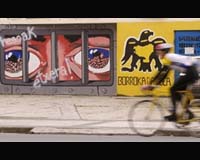| . |  |
. |
Berlin (UPI) Oct 26, 2010 A heated conflict over a planned new train station in Stuttgart has turned into a serious problem for German Chancellor Angela Merkel's conservatives and national railway company Deutsche Bahn. Tuesday was a tough day for the German logistics giant. All over the country, striking Bahn workers angry at wage discrepancies severely disrupted train travel. In front of the lavish company headquarters at Potsdamer Platz in downtown Berlin, some 600 people gathered to move their protest against a new train station, called Stuttgart 21, into the national spotlight. "Stuttgart 21 is a disastrous project," Otto Hartmann, 59, from Stuttgart, told United Press International. "So many people are vehemently against it, even Ms. Merkel is realizing that now." Backed by federal and state funding, Deutsche Bahn aims to turn Stuttgart's 1920s train station, now a dead end, into an underground high-speed railway hub. In planning for the past 15 years, the massive project would require significant re-landscaping of the inner city and the digging of miles of tunnels at a cost of at least $10 billion. Protesters are worried about the ecological impacts of construction and want the old, above ground train station modernized for less money. "We're spending billions on a project that will benefit big business but we don't have enough money to modernize schools. Our politicians' priorities are set completely wrong," said Jamshid Nasseri, 49, from Winnenden outside Stuttgart. Opposition to the project has been steadily growing since work started this summer. Every Monday, tens of thousands of citizens of Stuttgart -- a rich and largely conservative city home to industry giants Daimler Chrysler and Bosch -- gathered for protest marches, urging the local state government, led by Stefan Mappus of Merkel's Christian Democratic Union, to bury Stuttgart 21. "The special thing about the protests is that they're driven by Merkel's traditional voters, the conservatives, many of them older people," Otmar Jung, a political expert at Berlin's Free University, told United Press International in a telephone interview Tuesday. "In that, the protests are symptoms of Germany's demographic change -- society is becoming older and much more skeptical toward such large infrastructure projects." The demonstrations didn't turn into a national embarrassment until last month, however. Protesters trying to stop the felling of some 25 trees threw chestnuts and plastic bottles at police, who responded by firing tear gas and water cannons at close range, injuring more than 100 people, including children. The images of bleeding protesters, most of them your average middle-class CDU voters, were broadcast all over the nation. Mappus, the state governor, has since halted demolition work and the cutting down of trees. However, polls suggest that his CDU, which has ruled the state for half a century, could lose the elections. The supporters of Stuttgart 21, who have also organized demonstrations, argue that the underground transit hub would benefit the local economy by creating thousands of jobs and freeing around 10 hectares of new inner-city land. They also point out that the project has been green-lighted by multi-layered democratic processes. Jung, the political expert, criticized the way politicians handled the permitting process. "Everything was done in a legal and correct manner but politicians have failed to involve and convince the people," Jung said. A well-respected conservative, 80-year-old Heiner Geissler, has since been named by Mappus to mediate in the conflict, with discussion rounds between both sides broadcast live on the Internet. Otto Hartmann, the protester, said he is optimistic that the negotiations can "result in real change." "But if it's just empty talk and no action, then even more people will take the streets in Stuttgart," he said.
Share This Article With Planet Earth
Related Links Great Train Journey's of the 21st Century
 Anti-rail protesters turn Basque rivers bright green
Anti-rail protesters turn Basque rivers bright greenMadrid (AFP) Oct 25, 2010 Activists turned rivers bright green in Spain's northern Basque Country at the weekend to protest a high-speed rail project, the regional government said Monday. In an apparently coordinated action, the protesters dropped a non-toxic substance, fluorescein, into Basque river channels on Sunday morning, a spokesman for the Basque interior ministry said. The dye briefly affected a stretch ... read more |
|
| The content herein, unless otherwise known to be public domain, are Copyright 1995-2010 - SpaceDaily. AFP and UPI Wire Stories are copyright Agence France-Presse and United Press International. ESA Portal Reports are copyright European Space Agency. All NASA sourced material is public domain. Additional copyrights may apply in whole or part to other bona fide parties. Advertising does not imply endorsement,agreement or approval of any opinions, statements or information provided by SpaceDaily on any Web page published or hosted by SpaceDaily. Privacy Statement |